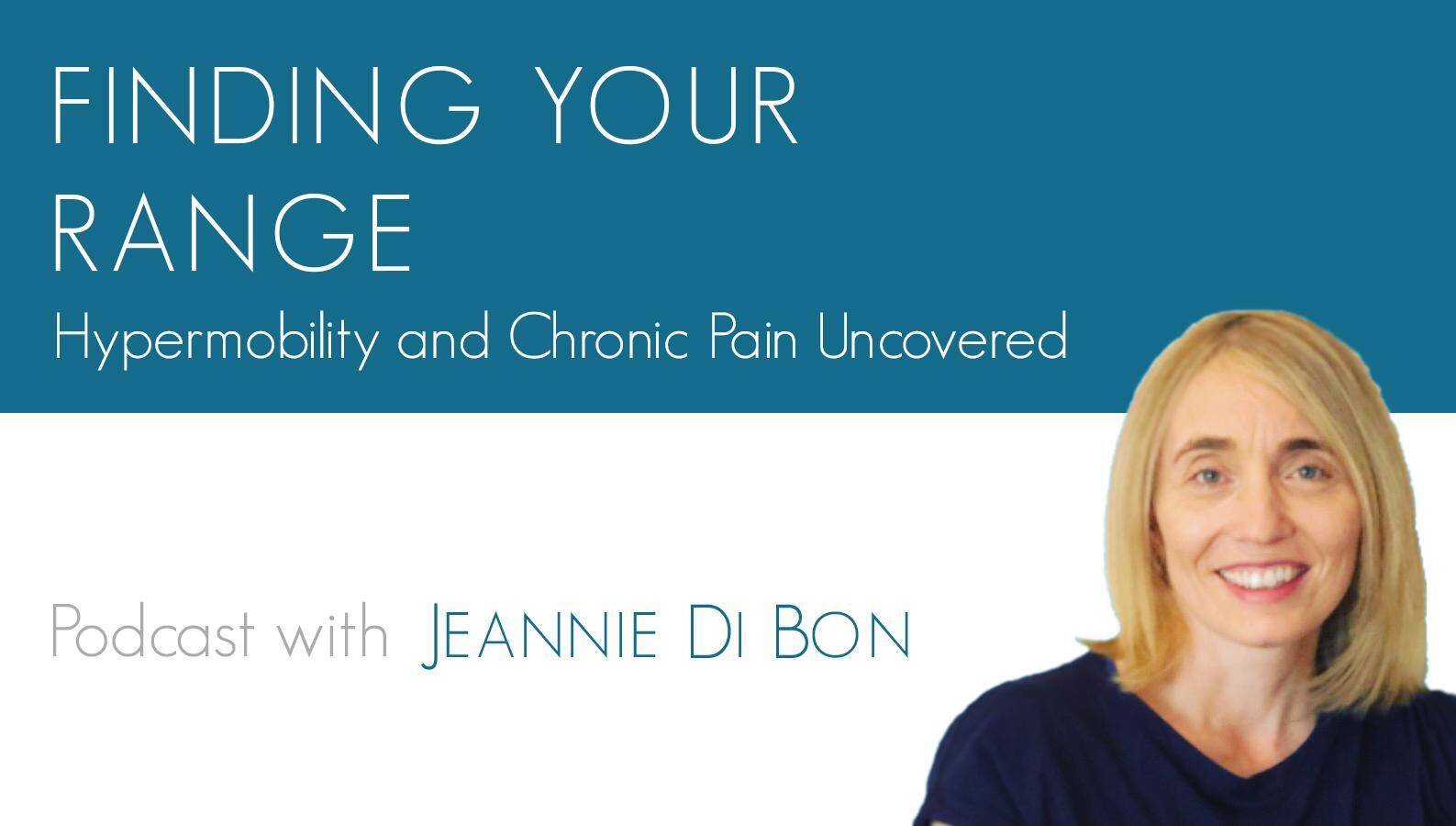
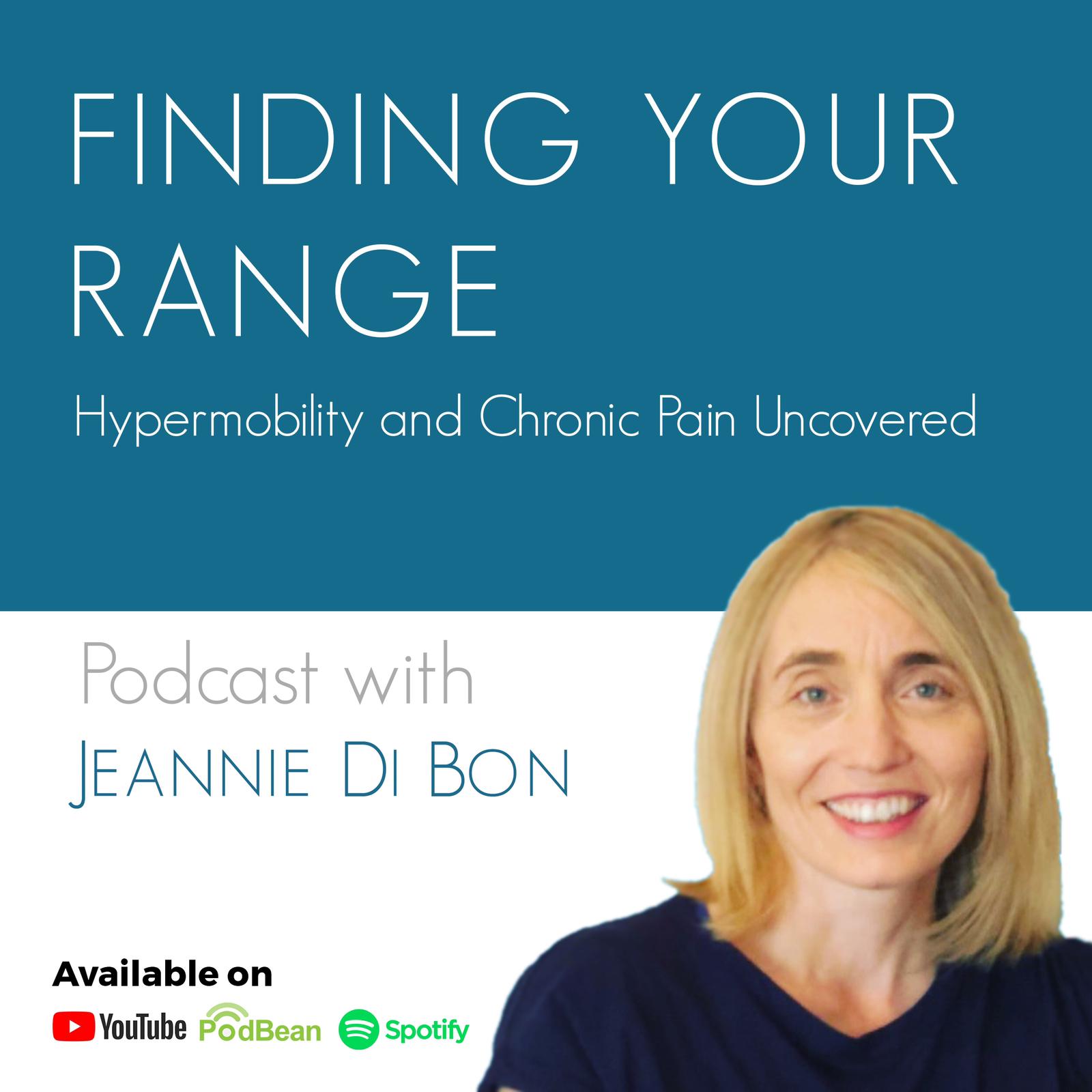
7.3K
Downloads
27
Episodes
Welcome to Finding Your Range, the Podcast which uncovers the truth behind living with hypermobility, Ehlers-Danlos Syndrome and chronic pain. Your host is Jeannie Di Bon, a movement therapist who specialises in working with clients with these conditions. She is also the author of two books - Pilates Without Tears and Hypermobility Without Tears. She is an educator of teachers and therapists in the field of movement for hypermobile patients and speaks regularly for The EDS Society and the HMSA. Jeannie also has hypermobile EDS and was a chronic pain sufferer herself. Her passion is to help others move pain-free. This Podcast features expert guests and patient stories. We hope you enjoy this Podcast. Thank you for listening.
Episodes
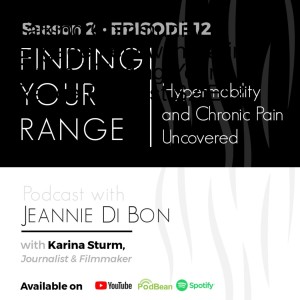
Sunday Apr 24, 2022
Sunday Apr 24, 2022
Please join me in welcoming Karina Sturm to Finding Your Range podcast.
Karina is a multi-media journalist and filmmaker from Germany who lived in the US for seven years. She gained significant scientific knowledge through studying laboratory technology and working in research for several years. Due to a chronic illness and invisible disability, she found her passion for media production and has been working as a freelance journalist since 2013.
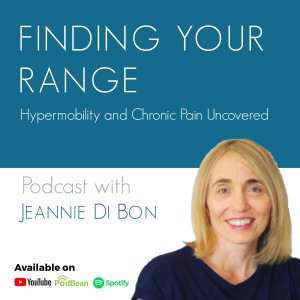
Sunday Apr 10, 2022
EDS Patient Advocacy | Finding Your Range Podcast S2:E11
Sunday Apr 10, 2022
Sunday Apr 10, 2022
We often find it hard to advocate for ourselves. I’m delighted to be joined this week by a leading expert of patient advocacy. Please join me in welcoming Maggie Buckley to Finding Your Range. Maggie Buckley, MBA, BCPA, has been a Health and Patient advocate for more than 25 years while living with the chronic pain condition Ehlers-Danlos Syndrome. She has served on the boards of several non-profit patient and professional organizations. She has testified at local, state and federal policy hearings, spoken at conferences and in the media, written articles and coached hundreds of people to self-advocate for better care written articles. Maggie has an M.B.A. in accounting with experience in banking and business management. In 2019 she became a Board Certified Patient Advocate (BCPA).
The information in this podcast is not designed to replace medical advice.
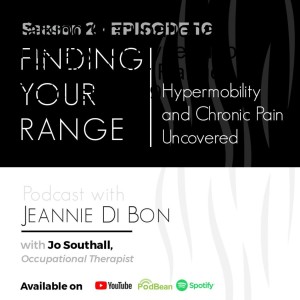
Sunday Mar 27, 2022
Sunday Mar 27, 2022
I’m excited to speak with Jo Southall in this episode of Finding Your Range. Jo is an Independent Occupational Therapist and expert patient with many years of experience self-managing complex health conditions. She lives with Hypermobile EDS, Postural Tachycardia and Visual Stress. Her own lived experiences combined with OT theory form the basis for her online practice.
Jo volunteers for the Hypermobility Syndromes Association and is on their medical advisory board too.
Regular OT work is mostly 1:1 appointments with clients and their loved ones. She is a regular guest lecturer; she leads webinars and training sessions both in the UK and abroad. Jo recently started down the Practice Educator route.
Welcome Jo. Please note the content of this podcast is not designed to replace any medical advice. Please do speak to your medical professional if you have any queries or concerns.
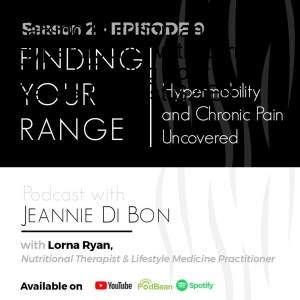
Sunday Mar 13, 2022
Sunday Mar 13, 2022
This week I am joined by Lorna Ryan. Lorna Ryan is a registered Nutritionist/Nutritional Therapy and Lifestyle Medicine Practitioner specialising in supporting those with Hypermobility (hEDS/HSD). She has particular interest in gastrointestinal manifestations & autonomic involvement, an interest directed from her personal backstory of living with hEDS.
As a clinician trained in Clinical Nutrition, Lifestyle Medicine & the Functional Medicine Model, Lorna offers a distinctly personal & integrative approach to clients health in her private practice clinic. Lorna is committed to continuing research, is a member of the International Consortium’s Diet and Nutrition working group & is pursuing her PhD.
Lorna’s passion for educating people outside clinical practice is embodied in her platform ‘House of Hypermobility’, which delivers nutrition & lifestyle information for adults with hEDS. Lorna is hugely grateful for her EDS colleagues & believes together we can achieve the highest level of support for those navigating hypermobility.
Please note the content of this podcast is not intended to replace any medical guidance or advice. Please do speak to your medical professional if you have any concerns.

Sunday Feb 13, 2022
Living with Autism and EDS | Finding Your Range Podcast S2:E7
Sunday Feb 13, 2022
Sunday Feb 13, 2022
In this episode of Finding Your Range, we talk to Jane Green. In June 2018 Jane founded SEDS to increase local specialised support and improve awareness, knowledge and understanding of EDS/HSD and co-occurring conditions plus advocate in key areas of health, social care, education and transport accessibility locally. Previously, she taught at St Piers special epilepsy/autism school, she was an advisory autism teacher at a Local Authority, lead educationalist at NAS and helped design and led the AET training plus Assistant Headteacher. Unfortunately, her health declined and after being labelled ‘bendy' she was diagnosed with chronic fatigue syndrome (CFS) and fibromyalgia stopping her career in 2015. Only then she received a diagnosis of EDS3 now hEDS, but was immediately discharged as there was no defined treatment protocol. Currently, Jane champions symptomatic hypermobility and autism health on various health and research organisations, education and social care groups and air transport forums. She led the first UK school toolkit for symptomatic hypermobility and co-occurrences in EDS and JHS for primary and secondary schools which has already travelled overseas, in 2021. Recently she submitted her first manuscript. Please welcome Jane to the podcast. Please note this material is not designed to replace any medical advice. Please do speak to your medical practitioner if you have any concerns.
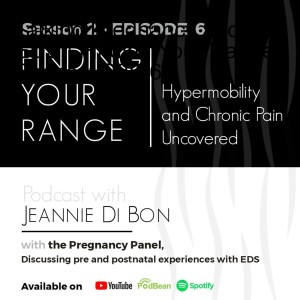
Sunday Jan 30, 2022
Talking Pregnancy and EDS | Finding Your Range Podcast S2:E6
Sunday Jan 30, 2022
Sunday Jan 30, 2022
In this unique episode of Finding Your Range podcast we here from a panel of prenatal and postnatal members of the hypermobile community. We discuss what issues and experiences they have had with getting pregnant, being pregnant and moving into postnatal. We know that female hormones play a huge role in hypermobility symptoms and pain. We explore these real life stories which I hope will be useful to anyone thinking of starting a family or finding strategies to manage a young family.
This is not designed to replace any medical advice. Please do see your midwife or GP if you have any concerns about anything raised in this podcast.
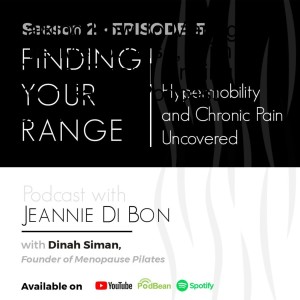
Sunday Jan 16, 2022
Sunday Jan 16, 2022
In this episode of Finding Your Range podcast, we hear from Dinah Simon – a Pilates teacher with a specialist interest in the menopause. I chat to her about the impact the menopause can have on women and how this can relate to EDS symptoms. A fascinating listen – I learnt a lot. Here’s an intro from Dinah: Teaching movement has been my passion for many years, starting with Jazz Dance and Aerobics in the ‘80s and evolving through Callanetics, to Pilates, Franklin Method, Gyrotonic and Yoga and Meditation. I’m very fortunate to have trained under Master Teachers such as Alan Herdman, Elizabeth Larkam, Eric Franklin, Leda Franklin, as I’ve followed my movement path. Pilates has remained my foundation work. After my initial 2 year Apprenticeship in the late ‘90s I continued my education with Polestar Pilates in 2003. I have taught Pilates in the Cotswolds since 1999, opening my Studio Contemporary Pilates in 2001. My fascination with the body lead me to study Myofascial Anatomy with Joanne Avison and Tom Myers and on to train as a Fascial Fitness trainer with Robert Schleip. The more I learned about movement the more I was drawn to Meditation which brought me to study with Alexander Filmer Lorch, becoming a Meditation teacher and Faculty member of his training school Inside Meditation. During all these years my biggest curve of clients has always been Menopausal women. Like most teachers I’ve been on a mission to find ways to facilitate movement potential for my clients so they remain strong and active into later years - that and have fun with it! The lack of main[1]stream information for women reaching this transition hit me profoundly once I also became Menopausal. Puzzles of my teaching past started to resolve as I joined the dots and made more sense of this massive physical, psychological and emotional total life shift and helping clients and teachers understand this transition has become my passion project. Earlier this year a podcast I recorded with Dr Louise Newson the leading Menopause Doctor was released discussing the benefits of Pilates in Menopause. I am continuing to work with Dr Newson’s team to raise funds for the newly established charity ‘The Menopause Charity’ which is a much needed resource for women, along with other Pilates projects. From May 2020 to June 2021 I worked with the Menopause Dietitian Nigel Denby .supporting Menopausal women with Pilates for weight management. With Nigel I was part of the team of experts for Harley Street at Home Menopause, an integrated approach to Menopause care with a specialist Doctor, Yoga teacher, CBT practitioner and Self Worth Coach, Pelvic Floor expert and fitness professional also. In April 2021 I launched my accredited Menopause Awareness Continuing Professional Development course for Pilates Teachers to further educate and empower instructors. The feedback has been very positive - this is my Pilates passion project! Menopause can be a time of enormous opportunity if we feel empowered through education and awareness. Menopause Pilates is an integrated approach inspiring women and teachers through movement and education.
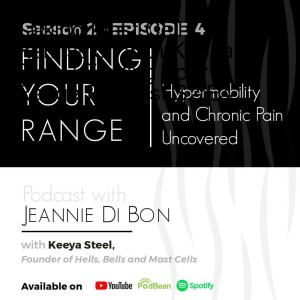
Monday Dec 27, 2021
Monday Dec 27, 2021
In this episode, we hear the extraordinary story of remission from mast cell reactions which has totally transformed the life of Keeya Steel. Keeya was a guest on Season 1 of the Podcast where she described how difficult her life had become. You won’t recognise her this time around.
After a lifetime of symptoms, Keeya Steel was diagnosed with mast cell activation syndrome in 2015. Soon after, in effort to cope with the disease, Keeya created Hell's Bells and Mast Cells, a blog and collection of memes raising awareness about chronic illness and disability through humour. This past spring, thanks to a new medication, Keeya's MCAS symptoms went into remission. Her daily dysautonomia and EDS symptoms also disappeared. Keeya lives in Minneapolis, Minnesota with her two poodles, Quixote and Sancho.

Sunday Dec 12, 2021
Sunday Dec 12, 2021
In this episode we are joined by Dr Linda Bluestein. I’m delighted to talk to Dr Bluestein about her own EDS, her passion for dance and helping the hypermobile community of dancers and performing artists.
Dr Linda Bluestein has been practicing medicine for over 20 years and has helped countless people restore function and improve their quality of life. Her special interest in treating performing artists (who are at increased risk of hypermobility disorders) stems from her many years as a ballet dancer and shattered dreams of turning professional due to her own EDS.
An integrative medicine physician with certification in Performing Arts Medicine, Dr Bluestein takes a unique approach to the evaluation and treatment of this highly specialized population.
Dr Bluestein is an international speaker on the forefront of research on pain, hypermobility and dance medicine. Professional services include individual telemedicine visits as well as workshops and lectures for groups. Dr Bluestein received her Doctor of Medicine from the University of California, Los Angeles School of Medicine followed by the completion of an anaesthesiology residency at the Mayo Graduate School of Medicine. She is board-certified by the American Board of Anaesthesiology.

Sunday Nov 28, 2021
Sunday Nov 28, 2021
Welcome to Episode Two. Today we are talking scar tissue – what is it and how does it impact our tissue. How is our movement with hypermobility impacted by scar tissue? We know that people with a connective tissue disorder are more prone to scar tissue complications. Here we discuss although this is not intended to be taken as medical advice.